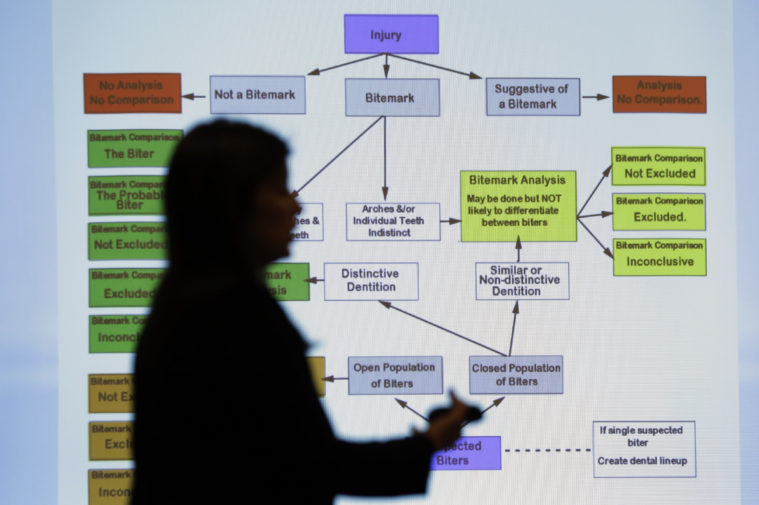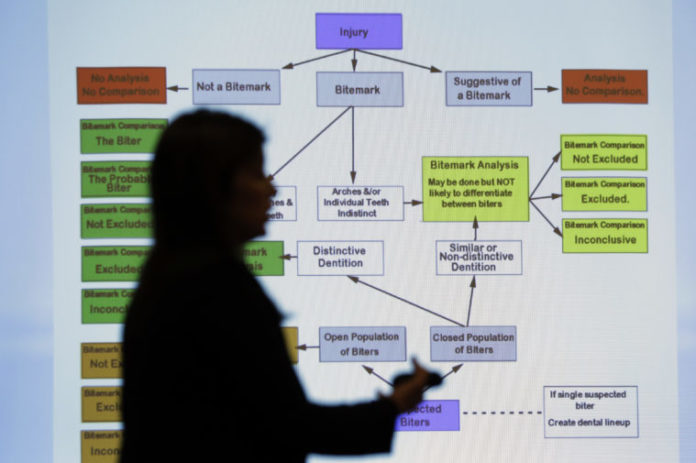Kosoul Chanthakoummane, the son of Laotian immigrants, is set to be executed on Aug. 17 in Texas for the murder of Dallas-area realtor Sarah Walker. On the afternoon of July 8, 2006, Walker’s body was discovered by a couple visiting a model home in the Craig Ranch subdivision in McKinney. She had been stabbed 33 times, but the Collin County Medical Examiner noted that ten knife wounds had punctured vital organs or blood vessels—any one would have been fatal. She had put up a fight. She had a broken nose and fractured teeth. And—a point that would later prove critical at the trial—she had a bite mark on the back of her neck.
Discredited forensic techniques were subsequently used to help convict Chanthakoummane of capital murder, including long-debunked bite mark evidence and hypnosis of witnesses.
Forensic dentistry consultant Brent Hutson was brought in to examine the bite mark on Walker’s neck before the initial trial. He made a mold of the mark and Chanthakoummane’s teeth and compared them using Adobe Photoshop. His determination: He was “unable to exclude [Chanthakoummane] from that population of individuals that could have inflicted this injury,” according to court documents. But bite mark evidence, in the years since this investigation, has been entirely discredited. A 2016 report from the White House deemed it an invalid forensic practice, and the Texas Forensic Science Commission issued a moratorium on the discipline’s use that same year.

In addition to the debunked evidence, two witnesses, another realtor and her husband, testified to seeing a “man of Asian descent” walking toward the model home before Walker arrived that day. DNA collected at the scene and this eyewitness testimony eventually led investigators to Chanthakoummane, then 25. But both underwent hypnosis, led by Texas Ranger Richard Shing, before sitting down with a sketch artist. They were instructed to picture and manipulate memories in their “mind’s eye” to imagine the person they saw from new angles. Chanthakoummane’s appeal suggests this strategy—that incorrectly treats human memories like files that can be zoomed in on and refocused—could actually result in false or misleading testimony. The Texas Rangers were long-known for using forensic hypnosis to elicit confessions or damning evidence from suspects until they finally suspended the practice in 2021.
The Texas Court of Criminal Appeals held that the jury would have likely convicted Chanthakoummane with or without the challenged evidence, as DNA evidence also placed him at the scene, but the use of the bad forensic techniques cast doubt on whether he received a fair trial.
Chanthakoummane’s lawyers have also challenged the DNA evidence. On Tuesday, they submitted an affidavit from a forensic expert regarding how the DNA evidence was analyzed as part of an appeal to the Texas Court of Criminal Appeals, the state’s highest court for criminal cases.
Two key witnesses underwent forensic hypnosis, a practice which incorrectly treats human memories like files that can be zoomed and refocused.
Eric Allen, Chanthakoummane’s lawyer, said the goals are “for him to wake up on the 18th, to be able to fully litigate this DNA issue based on this affidavit … and to ultimately get him a new trial.”
Sopha Monica Xaykosy, Chanthakoummane’s sister and their mother both publicly maintain that he is innocent. “We have more questions, just like everyone else has questions … but it doesn’t make sense,” Xaykosy said.
In 2017, the Texas Court of Criminal Appeals stayed the execution, and ruled that the questions about dubious forensics raised by his lawyers deserved another look by the trial court. But the trial court ruled against Chanthakoummane and that ruling was upheld. His team attempted to appeal to The U.S. Supreme Court multiple times, but the court denied the petitions.
Chanthakoummane admitted to police that he had entered the model home, saying he was having car trouble, court records show. While inside, he went to the kitchen sink for a glass of water. He said he had cuts on his hands at the time from his job, which could explain why his blood was found at the scene. Investigators moved forward with Chanthakoummane as their prime suspect, citing burglary as the motive. A watch and ring were taken from Walker, although neither was recovered, according to appeals. Prosecutors pointed to a recent overdraft on Chanthakoummane’s bank account and noted that he had previously been convicted of robbery in North Carolina—he had recently been paroled.
Since his arrest for Sarah Walker’s murder, Chanthakoummane has maintained his innocence. But during the opening statement at trial, his own lawyers conceded his guilt against his wishes, according to a sworn affidavit. In multiple appeals, Chanthakoummane has challenged the state’s reliance on now-debunked forensic practices.
“We don’t want to free killers, but we also don’t think the state can be trusted with the power to kill.”
Walker’s father, who is now deceased, was outspoken about his opposition to Chanthakoummane’s execution, but wasn’t called to testify.
“It is beyond my understanding why neither my trial attorneys nor the prosecutors called him to testify during the punishment phase,” Chanthakoummane wrote in a letter obtained by Death Penalty Action, a nonprofit raising awareness about his case.
Friends and supporters of Chanthakoummane plan to travel to Texas next week ahead of the scheduled execution. One woman has been writing letters to Chanthakoummane for more than six years.
Chanthakoummane is one of four Asian American people on death row in Texas and one of 46 nationwide. So far in 2022, eight executions have been carried out in the U.S., but only one in Texas. That man, Carl Wayne Buntion, sat on death row for 31 years before being executed on April 21, 2022. At 78, he was the oldest person ever to be executed in Texas. Chanthakoummane, 41, has spent less than 15 years on death row.
“We don’t want to free killers, but we also don’t think the state can be trusted with the power to kill,” said Abraham Bonowitz, co-founder of Death Penalty Action. “And we’ve seen that over and over again.”








